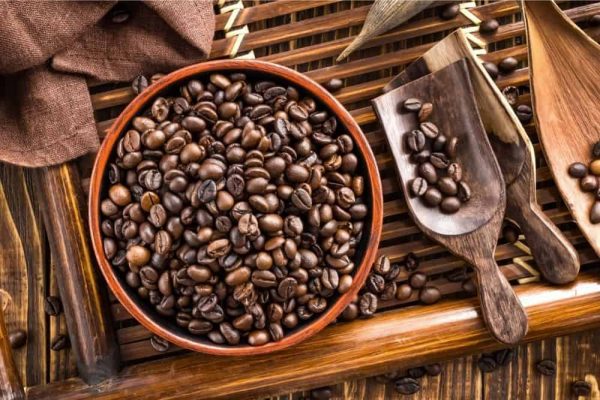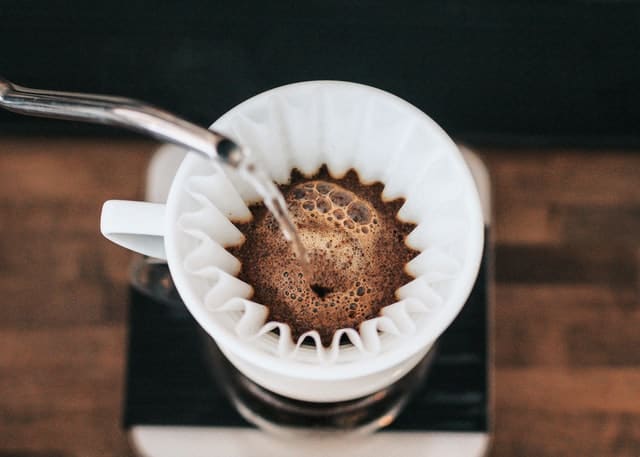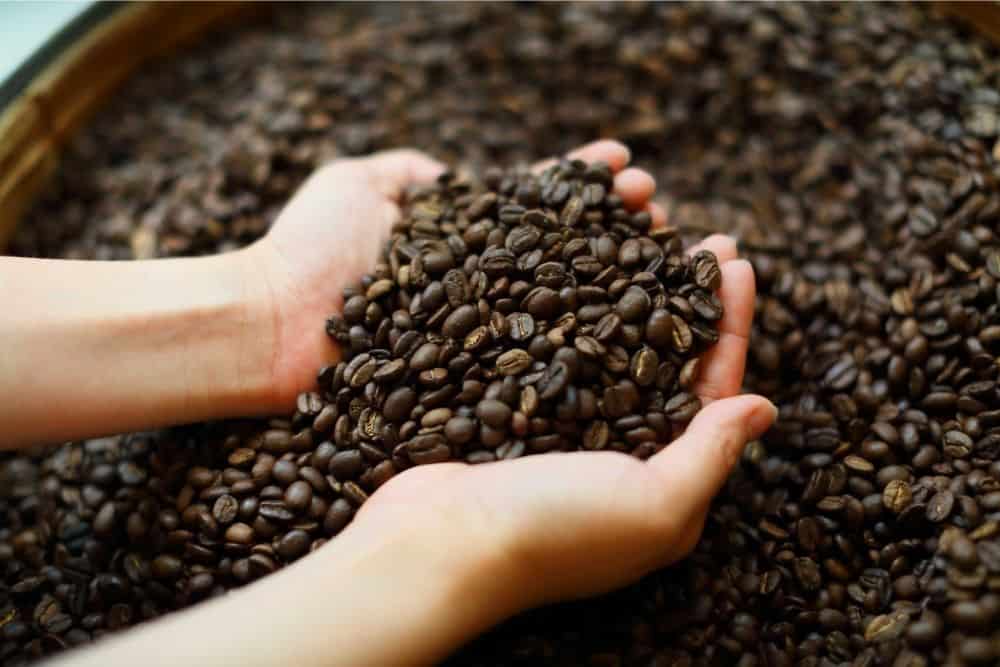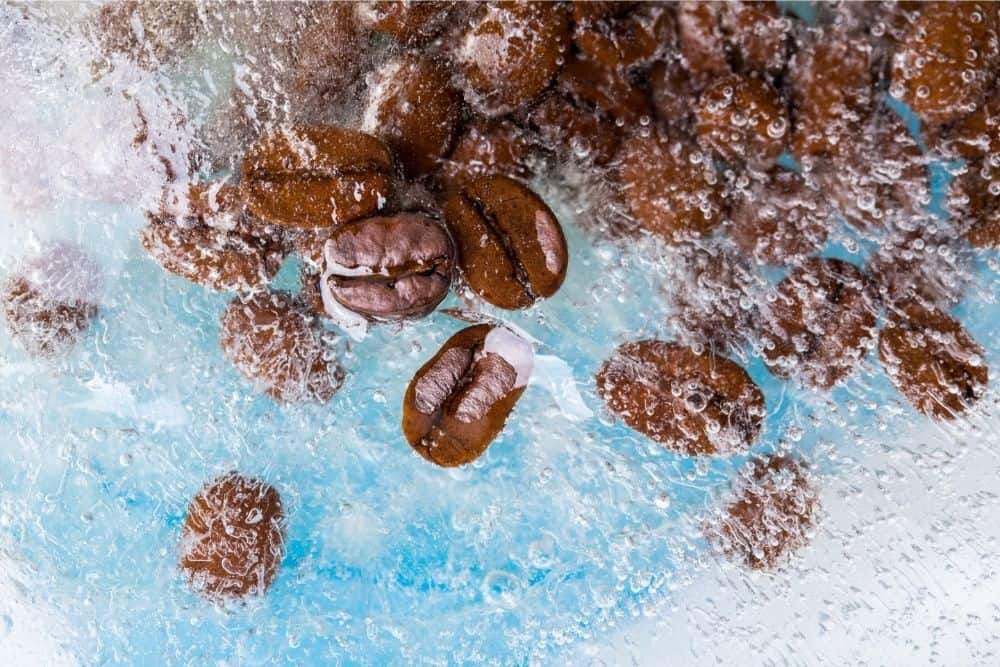Last updated on February 27th, 2023 by Jules Winnfield
There’s nothing quite like cracking open a brand-new bag of coffee beans. That amazing flavor and aroma just bursts out of the bag. Enticing and rich. Just waiting to be ground ready for a hot cup of freshly brewed coffee.

A huge part of many people’s everyday rituals includes drinking coffee (or eating it), particularly when it’s made from fresh coffee beans.
However, like any fresh product, coffee beans don’t last forever. Once roasted they actually start to degrade, and the second you pop the seal on that bag the process speeds up.
There is a lot of advice online about how to best store coffee beans, ranging from pretty straightforward (sealing them) to more creative ideas (freezing and vacuum packing).
But, if you’re just trying to make sure your coffee beans stay fresh and delicious, the big question you need to ask is how long coffee beans last.
This guide is here to help you. We’re going to look at how coffee beans lose their freshness over time, what influences this, and how they fare in different storage situations. You won’t need to worry about your whole coffee beans going stale again once you’ve finished here!
At the end of this guide, we’ll round up some of the most frequently asked questions about how long coffee beans last just in case you have any lingering queries that haven’t been answered.
What Makes Roasted Coffee Beans Go Stale?
Green coffee beans (as unroasted coffee beans are called) have a pretty good shelf life and can last a very long time. However, you’re unlikely to be roasting your beans at home, unless you are a true coffee snob!
A big part of the reason for roasting coffee beans is that it enables you to extract more of the complex chemical compounds within the beans. This also means that roasted coffee starts to degrade a lot quicker than unroasted coffee.
The primary reason for this is oxidation. When the delicious chemicals that make up the taste and smell of your coffee are exposed to air, they react with the oxygen to form new compounds.
This makes your coffee start to lose its flavor, and over time it will eventually taste nothing like the coffee you want it to.
Caffeine is less reactive with oxygen, so your beans will still give you a kick even as their flavor disappears. But when you’re in the freshly roasted coffee beans game, it’s flavor you want!
This oxidation problem is only exacerbated when you are trying to store ground coffee. You grind your fresh coffee beans to produce more surface area, which is what makes your brewed coffee taste the way it does.
If you tried to brew coffee using whole beans versus coffee grounds, you would see just how much of a difference this makes!
However, the higher surface area provided by ground beans versus your whole coffee bean means there’s more space for the oxidation reaction to occur, which means that ground coffee loses its fresh flavor faster.
Carbon Dioxide

Photo by Tyler Nix
The other main thing that affects the shelf life of coffee is the carbon dioxide (CO2) content. All coffee contains an amount of CO2 that starts to be released when it is roasted.
Freshly roasted coffee beans go through a two-week period of degassing, which is when most of the CO2 escapes, but some is still left in your coffee beans when you get your hands on them.
When you pour boiling water on your coffee grounds, it speeds up the release of the CO2 that’s still within them. This leads to the fabled ‘bloom‘, a step in the coffee brewing process that many coffee drinkers anticipate when they’re aiming for the perfect brew.
The CO2 bubbling out of the beans helps to extract more flavor compounds, leading to a better drink as a result.
Carbon dioxide escapes over time. If your coffee beans aren’t stored appropriately you will lose alot of CO2, and as a result possibly lose your bloom! No bueno.
How To Stop Coffee Beans Going Stale
Whether you’re storing freshly roasted beans or ground coffee beans, to avoid your coffee going stale you’ll need a suitable way to store it. Properly storing your coffee beans goes a long way towards slowing down the process of oxidation and helps your coffee stay fresh.
It also makes your pre-ground coffee or whole coffee beans last longer. This mean you don’t have to replace your coffee before you run out (which isn’t really a problem for a lot of coffee drinkers!).
The most important thing is to prevent air from getting to your coffee beans. The simplest way to do this is to store coffee in an airtight container, be it coffee grounds or whole roasted coffee beans.
Either seal your coffee bags back up again tightly, or put them in a jar or tub with a tight-fitting lid. But can you take things a little further?
Keep the Air Out
The next step up from an airtight container would be to vacuum seal your coffee beans. If there’s no air, there’s nothing to make the oxidation reaction work. Although, you will still lose some CO2 over time.
There are a range of coffee storage canisters on the market that feature vacuum pumps to remove unwanted air, like the Fellow Atmos Vacuum Canister, which promise to keep your coffee fresh for longer.
Cool Things Down
Making things cold tends to slow down most chemical reactions, and oxidation is no different. This is why you’ll often find advice online to freeze your coffee beans.
The problem with this is that coffee beans are pretty porous. They’ll take up flavors and scents from other things in your freezer, and that means you can end up with coffee that tastes like various foods!
Imagine a coffee flavor called TV dinner! Yuck.
If you’re going to freeze your coffee beans, make sure you put them in an airtight container before you put them in the freezer. This will prevent smells and tastes transferring to them.
How Long Do Coffee Beans Last?

Now we’ve discussed why coffee beans go stale and how you can prevent it, let’s take a look at how long coffee beans last.
First, we’re going to talk about coffee beans as a whole, then take a look at how the various different storage methods can affect the shelf life of your coffee beans.
Roasted Whole Coffee Beans In A Bag
When you buy coffee beans, they tend to come in a bag. There’s a few types of coffee bags that you’ll find out in the wild depending on where you buy your coffee from.
Small, artisanal coffee roasters sometimes use bags that are sealed with a twist clip or hot iron on the premises. These provide a little bit of protection from the elements as any sealed container would, but aren’t the best.
They’re designed for drinkers who are going to take the beans home and get grinding right away, and likely then store them in some other appropriate vessel.
Coffee beans packaged like this will last between two to three weeks at most, and you’ll see some noticeable degradation of flavor and quality in the latter half of that time period.
Some big suppliers vacuum seal their bags to keep their coffee fresh. You can tell when a bag has been vacuum sealed because you can see and feel the beans under your fingers when you pick it up.
Vacuum sealing coffee bags makes the beans last for three to five months when unopened.
The other type of coffee bag you will encounter most often is likely to come from a bigger roastery. These bags are sealed and flushed with nitrogen, which prevents oxidation from occurring.
They’re the ones you’ll find that are plump to the touch when you pick them up. Coffee beans stored in a nitrogen-flushed bag can last for up to 12 months if unopened.
In an Airtight Container
The most common home storage method for coffee is in a tub or jar with an airtight seal. You want to make sure that you’re keeping your coffee in a cool, dark place to prevent any further loss of flavor. Coffee stored like this will last anywhere up to three weeks.
In a Vacuum Sealed Container
If you upgrade your standard airtight container to a vacuum sealed one, you can get more life out of your coffee. It will last for around three months in a vacuum sealed tub. This is slightly less than if it were in an unopened vacuum sealed bag due to the need to open the tub to make coffee!
In the Freezer
Here’s where a bit of controversy creeps into the topic of coffee bean storage. Freezing coffee has been advocated for by lots of coffee fans for a long time, but it also has a legion of detractors.
As coffee culture has moved from being simply about consuming a perishable product towards more scientific brewing, even for home coffee lovers, there has been a drive towards buying smaller amounts of fresher coffee to be used faster.
However, if you’re a more casual drinker, or if you prefer to buy your favorite coffee in bulk, you may be drawn to the idea of freezing your coffee.
We’ve already spoken about the need to make sure that your coffee is well sealed before it goes in the freezer, so you might only want to do this if you’ve got a whole bag of something tasty that you’d like to keep fresh for longer.
Assuming you have a vacuum sealed bag that’s unopened, you can extend the life of your coffee to up to three years by freezing it!
This is at the very extreme, and there will still be some flavor degradation over that period of time. But there’s no other way to get coffee to stay close to fresh for anything like that time period. However, this doesn’t hold true if you are using the coffee from the freezer. It only works if it stays sealed.

Freezing Coffee
Problems With Freezing Coffee
When you freeze beans to be used daily, what you end up doing is subjecting it to a constant fluctuation in temperature and humidity. This isn’t good for the life of your coffee at all.
Coffee is a fairly volatile substance and likes to be stored in a stable environment. When you freeze coffee beans any residual moisture in them expands as it cools, which makes them more porous.
More porosity equals quicker oxidation and the loss of more CO2. Frozen beans are also more brittle, which affects how they grind.
Every time you open the bag from the freezer, you let the air from your kitchen into it. This air contains moisture, which will freeze and then condense when you bring the coffee back up to temperature again.
This cycle is seriously damaging for the lifespan of your coffee, and will negate any benefits you get from freezing it in the first place.
Defrosting Frozen Coffee

This matters if you’re trying to store coffee in the freezer for daily use, but it can also affect long-term storage too. When you’re getting your frozen bag of coffee out of the freezer, make sure you let it defrost slowly, preferably in the refrigerator.
You don’t want to put any additional stress on the beans as they come back up to room temperature.
Make sure you don’t open the bag to put your beans into their room-temperature storage before they’re fully defrosted. You’re seeking to avoid condensation.
If your sealed beans are half-defrosted and you decant them into a room-temperature tub, even one with a good seal, you’re going to end up with condensation as the moisture in the beans changes state.
This is going to ruin your coffee, leaving you with nothing to show for having frozen it in the first place.
Do Different Roasts Affect Shelf Life?
You’ll notice that we’ve not mentioned the roast of your coffee so far. This is a huge, huge part of coffee culture, and anyone who has a bit of insight into how coffee roasting works will be wondering why it’s not been discussed to this point.
The reason is that it’s important to get a benchmark figure for keeping coffee fresh.
The figures that we’ve discussed up to this point hold true for commercially available dark-roasted coffee that you can pick up from any store. However, coffee lovers will know that dark roast isn’t always where it’s at.
Many people now buy coffee with a lighter roast, which gives a very different flavor and allows the underlying notes of the specific coffee variety to come through more clearly.
How your beans are roasted does make an appreciable difference in terms of how long they last on the shelf.
Notes On Roasts
We’ve talked about how green beans stay fresh for much longer than roasted beans.
All roasts are on a scale from green to dark, with lighter roasts, such as white coffee, being roasted for shorter periods of time than dark roasts. A fuller roast makes the beans more porous and therefore easier to oxidise.
What this means for the longevity of your beans is pretty straightforward. Dark roasted coffee lasts for less time than lighter roasted coffee.
If you’re buying artisan-style small batch coffee, you’ll find it fits in the medium roast range, with some going even lighter. These roasts are more stable on the shelf, lasting for between 1.5 and two times as long as dark roasts.
All of the same caveats still apply to lighter roasts as they do to dark ones. Keep your beans in proper storage, be that an airtight container, a vacuum sealed tub, or in their bags unopened until you need them.
Ground Coffee
If you’re storing ground coffee, then all of the above applies in terms of how to make it last longer, but you have to be prepared for a shorter shelf life.
Once coffee is ground the oxidation process starts immediately in earnest, so you won’t get more than a day or two of great flavor out of your coffee under most conditions. If you have the ability to vacuum seal your ground coffee, then that is the most useful fix.
Frequently Asked Questions
Now that you’ve had a chance to read through why coffee goes bad, what you can do to prevent it, and how long you can expect your roasted beans to last, let’s look at some of the most frequently asked questions on the subject.
Do Whole Coffee Beans Go Bad?
Technically, no. Coffee beans don’t really go bad as such, but they do lose a lot of what makes them desirable due to oxidation.
Also, if stored improperly they can go moldy, which is definitely to be avoided! However, this takes a relatively long time and high humidity, so it’s not something that you need to be overly concerned about.
How Long Can You Keep Coffee Beans Unopened?
As we’ve discussed, there are a range of factors that determine how long you can keep an unopened bag of coffee that depend on the roast and the nature of the packaging.
The longest shelf life you could hope for in most cases is about six months, though you would have to expect to not get the best brew from a pack that old. Most coffee is at its best within two weeks of its roast date .
Do Coffee Beans Last Longer Than Ground?
Simply put, yes! Ground coffee has more surface area, which means more of those reactions that you want to minimize that lead to stale coffee.
Final Thoughts
So whether you are a pro coffee aficionado or beginner casual drinker who appreciates a flavorful brew, keeping your coffee beans fresh for as long as possible makes a lot of sense.
Hopefully you picked up a few ideas and methods in this complete guide and discussion that you can implement.
Now that you have fresh coffee, you can begin to think about pulling your favorite espresso beverage or a delicious pour over brew using a high quality machine like a Breville, Ninja, or whatever you can afford.
Seriously…what are you waiting for…get brewing and sipping!
Coffee Has Never Read This Good!
Sign up for a FREE newsletter to the best home brewing tips and guides
Thank you for subscribing to The Cup Coffee House Crew! There's a surprise in your Inbox 🙂
Something went wrong.
- About the Author
- Latest Posts

“Jules” is a pharmacist by day and investor, writer, and health nut by night. When he’s not sipping on some coffee laced with MCT oil during an 18 hour fast, he is writing about how to get your coffee grind on or playing Monopoly with his 2 boys and wife. Ahh…life is good!

Thank you for this wonderfully informative article. I just read about the freeze in South America affecting large swaths of coffee plantations and literally had a panic attack. Should I purchase a couple of coffee trees (I live in Washington State somewhat at the base of Mt. Rainier! (Unlikely a coffee tree would survive our ‘hellish’ winters…autumns and springs.) I will take your advice and find acceptable containers for several vacuum sealed bags of coffee, just in case I can no longer afford to buy coffee or worse, find coffee at the market.
Sign me, coffee since 1956 and my first day of school.
Yea I think a coffee tree would be a bit much! 🙂